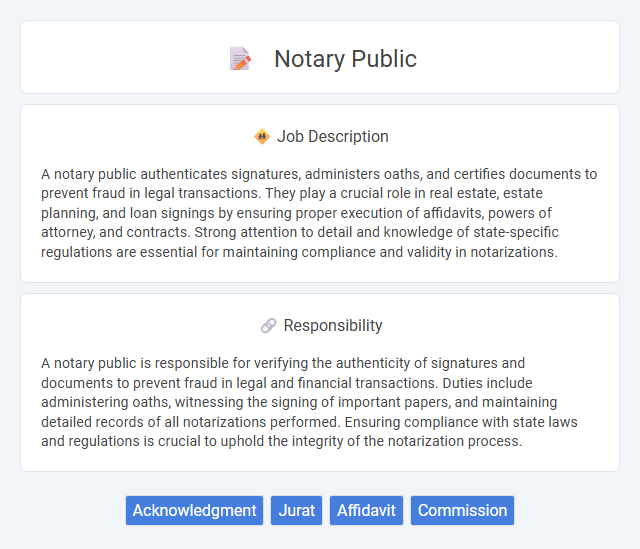
A notary public authenticates signatures, administers oaths, and certifies documents to prevent fraud in legal transactions. They play a crucial role in real estate, estate planning, and loan signings by ensuring proper execution of affidavits, powers of attorney, and contracts. Strong attention to detail and knowledge of state-specific regulations are essential for maintaining compliance and validity in notarizations.
Individuals with strong attention to detail and a solid understanding of legal documents are likely to be well-suited for a notary public role. Those who demonstrate integrity, impartiality, and excellent communication skills may find this position aligns with their strengths. However, individuals who prefer fast-paced or highly social environments might find the notary public job less compatible with their preferences.
Qualification
A notary public must typically complete a state-approved training program and pass a comprehensive exam proving knowledge of legal documents and ethical standards. Applicants often need to meet eligibility criteria such as being at least 18 years old, a legal resident, and having a clean criminal record. Some states require a surety bond or background check to ensure trustworthiness and protect the public.
Responsibility
A notary public is responsible for verifying the authenticity of signatures and documents to prevent fraud in legal and financial transactions. Duties include administering oaths, witnessing the signing of important papers, and maintaining detailed records of all notarizations performed. Ensuring compliance with state laws and regulations is crucial to uphold the integrity of the notarization process.
Benefit
A notary public job likely offers the benefit of a flexible work schedule, appealing to individuals seeking autonomy in their professional lives. There is a probability of decent supplemental income, especially in areas with high demand for notarizations. Additionally, this role could enhance trustworthiness and professionalism, valuable traits in many business and legal contexts.
Challenge
The role of a notary public likely involves navigating complex legal documents with precision, which can present significant challenges in ensuring every detail adheres to regulatory standards. There is probably a steady demand for vigilance to prevent fraud, making accuracy and attention to detail critical components of the job. Handling diverse client needs and maintaining impartiality may also contribute to the challenging nature of this profession.
Career Advancement
Notary public professionals can advance their careers by gaining specialized certifications, such as becoming an Electronic Notary or Remote Online Notary, which expand service offerings in a digital landscape. Building expertise in legal documentation and compliance increases opportunities for leadership roles within law firms, banks, and government agencies. Continuous education and networking with legal and real estate sectors further enhance prospects for higher income and expanded responsibilities.
Key Terms
Acknowledgment
Acknowledgment is a critical function of a notary public, involving the official verification of a signer's identity and voluntary act in signing a document. This process helps prevent fraud and ensures the authenticity of signatures on legal and financial documents, such as deeds, affidavits, and contracts. Notaries public follow stringent identification protocols, including checking government-issued IDs, to provide a reliable acknowledgment that holds legal weight in courts and business transactions.
Jurat
A notary public performing a Jurat verifies the identity of the signer and ensures they personally appear before the notary to swear to or affirm the truthfulness of the document's content. The Jurat requires the signer to take an oath or affirmation, which the notary must administer and then sign and seal the document to certify the act. This process helps prevent fraud and guarantees that the signer understands the implications of the statements made in the document.
Affidavit
A notary public plays a vital role in verifying the authenticity of affidavits, ensuring that the sworn statements within are legally recognized. This certification process includes confirming the identity of the affiant and witnessing the signature to prevent fraud. Notaries maintain meticulous records of affidavits to support legal validity and enforce accountability.
Commission
A Notary Public is an official authorized by the state government through a commission to serve as an impartial witness in the signing of important documents. The commission grants notaries the legal authority to administer oaths, verify identities, and certify signatures, ensuring the authenticity and preventing fraud. Commission terms vary by jurisdiction but typically require renewal every four years to maintain valid notarial powers.
 kuljobs.com
kuljobs.com